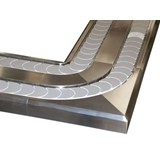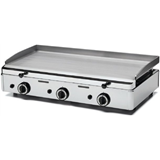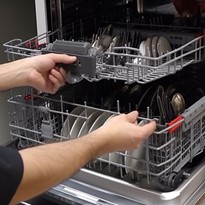When it comes to commercial kitchens, efficiency and cleanliness are paramount. One essential piece of equipment that plays a significant role in maintaining a smooth operation is a pass-through dishwasher. These powerful machines are designed to handle high volumes of dirty dishes, utensils, and glassware, ensuring they are cleaned, sanitized, and ready for reuse in the shortest time possible. If you're in the market for a pass-through dishwasher, this comprehensive buying guide will provide you with all the information you need to make an informed decision.
1. Understanding Pass Through Dishwashers
Pass-through dishwashers, also known as hood-type dishwashers or conveyor dishwashers, are specifically designed for heavy-duty use in commercial settings. These machines are typically found in restaurants, hotels, catering facilities, and other foodservice establishments that require rapid and efficient dishwashing capabilities. Unlike undercounter or countertop models, pass-through dishwashers are larger and more powerful, capable of handling a continuous flow of dirty dishes.
2. Capacity and Throughput
One of the most crucial factors to consider when purchasing a pass-through dishwasher is its capacity and throughput. The capacity refers to the number of racks or baskets that can be loaded into the machine at a time. A larger capacity dishwasher will allow you to clean more dishes in a single cycle, reducing downtime and increasing productivity.
Additionally, consider the machine's throughput, which refers to the number of racks it can process per hour. Higher throughput is especially important during peak hours when a steady stream of dirty dishes needs to be cleaned quickly. Look for models with adjustable conveyor speed settings to optimize throughput based on your specific needs.
3. Wash Cycle Options
Pass-through dishwashers offer various wash cycle options to accommodate different types of dishware and levels of soil. Common wash cycle options include light wash, normal wash, and heavy-duty wash. Some advanced models may even have additional specialized cycles for delicate glassware or heavily soiled pots and pans.
It's important to choose a dishwasher that provides flexibility in wash cycle selection, allowing you to adapt to changing demands and ensure optimal cleaning results for a wide range of items.
4. Temperature and Water Usage
Efficient water and energy usage are essential considerations for any commercial kitchen. Look for pass-through dishwashers that feature energy-efficient designs, such as built-in heat recovery systems or low water consumption features.
Temperature control is also crucial for effective cleaning and sanitization. Ensure the dishwasher offers adjustable temperature settings for both the wash and rinse cycles, allowing you to customize the water temperature based on the specific requirements of your dishes and local health regulations.
5. Construction and Durability
Commercial dishwashing equipment undergoes rigorous use, so durability and construction quality are paramount. Look for pass-through dishwashers made from robust materials such as stainless steel, which resists corrosion, withstands heavy use, and is easy to clean.
Consider the quality of components like the conveyor system, spray arms, and filters. High-quality components will not only enhance performance but also reduce the need for frequent repairs and replacements, saving you time and money in the long run.
6. Ease of Use and Maintenance
In a fast-paced commercial kitchen, ease of use and maintenance are crucial factors. Look for pass-through dishwashers with user-friendly controls and intuitive interfaces, enabling your staff to operate the machine with minimal training.
Consider models with self-cleaning features that help prevent the buildup of dirt, grease, and limescale, prolonging the dishwasher's lifespan and ensuring consistent cleaning performance.
Types of Pass Through Dishwashers and Their Uses in Commercial Kitchens
Pass-through dishwashers are an integral part of efficient operations in commercial kitchens. These powerful machines handle high volumes of dishes, utensils, and glassware, ensuring cleanliness and hygiene. When choosing a pass-through dishwasher for your establishment, it's essential to understand the different types available and their specific uses. This guide will walk you through the various types of pass-through dishwashers and help you make an informed decision for your commercial kitchen.
1. Standard Pass Through Dishwashers
Standard pass-through dishwashers are the most commonly used type in commercial kitchens. They are versatile and suitable for a wide range of foodservice establishments, including restaurants, cafes, and catering facilities. These dishwashers feature a conveyor system that carries the dirty dishes through the wash, rinse, and drying cycles. They offer excellent capacity, throughput, and flexibility in wash cycle options, making them ideal for high-volume dishwashing needs.
2. High-Temperature Pass Through Dishwashers
High-temperature pass-through dishwashers are designed to sanitize dishes using hot water and high-temperature rinse cycles. These dishwashers typically reach temperatures of 180°F (82°C) or higher during the final rinse, ensuring thorough sanitization. High-temperature dishwashers are especially beneficial for establishments with strict health and safety regulations that require a high level of sanitization. They are commonly found in healthcare facilities, schools, and other environments where hygiene is a top priority.
3. Low-Temperature Pass Through Dishwashers
Low-temperature pass-through dishwashers use chemical sanitizers, such as chlorine or iodine, in combination with lower temperature water for dish sanitization. These dishwashers are popular in establishments where energy efficiency is a primary concern. The use of chemical sanitizers eliminates the need for high-temperature rinse cycles, resulting in lower energy consumption. However, it's important to ensure compliance with local health regulations when using chemical sanitizers.
4. Conveyor-Type Pass Through Dishwashers
Conveyor-type pass-through dishwashers are designed for high-capacity dishwashing needs. They feature a continuous conveyor belt system that transports the dishes through the various stages of the washing process. These dishwashers are ideal for large-scale operations, such as banquet halls, cafeterias, and busy commercial kitchens that require a constant flow of clean dishes. Conveyor-type dishwashers offer high throughput, efficiency, and consistent cleaning results.
5. Flight-Type Pass Through Dishwashers
Flight-type pass-through dishwashers are similar to conveyor-type dishwashers but are specifically designed for heavy-duty use in large-scale foodservice establishments. These dishwashers feature a conveyor system with separate flights or compartments for different types of dishware, such as plates, glasses, and utensils. Flight-type dishwashers are highly customizable, allowing operators to adjust the wash cycle settings for each flight, optimizing cleaning results and throughput. They are commonly used in hotels, convention centers, and institutional kitchens.
6. Compact Pass Through Dishwashers
Compact pass-through dishwashers are suitable for establishments with limited space or lower dishwashing volumes. These dishwashers offer a smaller footprint without compromising on performance. Compact models are often found in small cafes, bars, or food trucks, where space is at a premium. Despite their smaller size, they still provide efficient and effective cleaning capabilities for smaller batches of dishes.
How to Choose the Right Pass Through Dishwasher for Your Restaurant or Cafe
In today's fast-paced restaurant and cafe industry, having efficient and reliable equipment is crucial to maintaining a smooth operation. One such piece of equipment that plays a significant role in the kitchen is a pass-through dishwasher. Selecting the right pass-through dishwasher for your establishment can greatly enhance your productivity and ensure sparkling clean dishes. In this comprehensive guide, we will walk you through the important factors to consider when choosing a pass-through dishwasher for your restaurant or cafe.
1. Assessing Your Needs and Requirements
Before diving into the world of pass-through dishwashers, it's essential to assess your specific needs and requirements. Start by considering the size of your establishment and the volume of dishes you need to wash on a daily basis. This evaluation will help you determine the appropriate capacity and speed of the dishwasher you should invest in.
Additionally, consider the available space in your kitchen. Measure the dimensions where you plan to install the dishwasher to ensure a proper fit. Take note of any height restrictions or space limitations that might impact your selection.
2. Understanding Different Types of Pass-Through Dishwashers
Pass-through dishwashers come in various types, each with its own set of features and advantages. Familiarizing yourself with these types will enable you to make an informed decision.
a. Hood-Type Dishwashers
Hood-type dishwashers are the most common and widely used in commercial kitchens. They feature a hood-like structure that covers the entire dishwasher, ensuring efficient water containment and reduced noise levels. These dishwashers are highly versatile and suitable for establishments with moderate to high dishwashing demands.
b. Conveyor Dishwashers
Conveyor dishwashers are ideal for high-volume operations. They utilize a conveyor belt system that moves dishes through the washing, rinsing, and drying stages. These dishwashers offer excellent productivity and are well-suited for large-scale restaurants or cafeterias.
c. Flight-Type Dishwashers
Flight-type dishwashers are designed for industrial-scale operations, such as large-scale catering facilities or central kitchen operations. They are capable of handling enormous quantities of dishes per hour, making them suitable for high-demand establishments. However, these dishwashers require significant space and are generally not recommended for smaller restaurants or cafes.
3. Efficiency and Performance
When it comes to pass-through dishwashers, efficiency and performance are of utmost importance. Look for energy-efficient models that can help reduce utility costs while minimizing environmental impact. Energy Star-certified dishwashers are an excellent choice as they meet stringent efficiency standards.
Consider the dishwasher's water consumption as well. Opt for models that feature water-saving technologies or adjustable settings to ensure optimal water usage without compromising cleaning performance.
Moreover, pay attention to the dishwasher's washing and drying capabilities. Look for features such as multiple wash cycles, adjustable wash pressure, and efficient drying systems. These factors contribute to achieving spotless and hygienic results while maintaining the integrity of your dishware.
4. Ease of Use and Maintenance
Simplicity and ease of use are essential for the smooth operation of any piece of equipment in a bustling kitchen environment. When selecting a pass-through dishwasher, look for intuitive controls, user-friendly interfaces, and clear operating instructions. Training your staff to operate the dishwasher efficiently will save time and minimize the risk of errors.
Furthermore, consider the dishwasher's maintenance requirements. Opt for models that offer easy access to key components, such as filters and spray arms, for regular cleaning and maintenance. Some dishwashers also come with self-cleaning functions or automated cleaning programs, streamlining the maintenance process.
5. Durability and Reliability
Investing in a pass-through dishwasher is a significant decision, so it's crucial to choose a model that is built to last. Look for dishwashers made from high-quality materials, such as stainless steel, which is durable and resistant to corrosion. A sturdy construction ensures that the dishwasher can withstand the demands of a busy kitchen environment.
Additionally, consider the reputation and reliability of the manufacturer. Research customer reviews and ratings to gauge the overall satisfaction and reliability of the dishwasher you are considering. Opting for a reputable brand known for producing reliable equipment will give you peace of mind and minimize the risk of unexpected breakdowns.
6. Safety Features
Maintaining a safe working environment is essential for both your staff and customers. When selecting a pass-through dishwasher, look for built-in safety features that prioritize user protection. These features may include heat and steam insulation, safety interlocks, and automatic shutdown mechanisms to prevent accidents.
Furthermore, consider dishwashers with integrated chemical dosing systems. These systems ensure precise and consistent dosing of cleaning chemicals, minimizing the risk of human error and promoting safe handling practices.
7. Noise and Environmental Considerations
In a bustling restaurant or cafe, excessive noise can disrupt the ambiance and overall dining experience. Look for pass-through dishwashers that feature noise reduction technologies, such as sound insulation and vibration dampening. These features help maintain a quieter environment, allowing your staff to work efficiently without causing unnecessary disturbances.
Environmental considerations should also be taken into account. Opt for dishwashers that adhere to eco-friendly practices, such as low water consumption and energy efficiency. Not only will this help reduce your ecological footprint, but it may also contribute to cost savings in the long run.
8. Cost and Return on Investment
While cost is an important factor, it should not be the sole determining factor in your decision-making process. Consider the long-term benefits and return on investment (ROI) that a pass-through dishwasher can provide. A more expensive dishwasher with advanced features and greater efficiency may result in significant savings on utility bills and labor costs over time.
Evaluate the warranty and after-sales support offered by the manufacturer. A comprehensive warranty and reliable customer service ensure that any issues or repairs will be promptly addressed, minimizing downtime and maximizing the lifespan of your dishwasher.
Pass Through Dishwasher Budgeting: How Much Should You Spend?
ass-through dishwashers come in a range of prices based on various factors, including capacity, features, quality, and brand reputation. Understanding these factors can help you determine the price range that aligns with your budget and specific needs. Here is a more in-depth breakdown of the price ranges and the reasons behind them:
-
Budget Range: $1,000 - $3,000
In the budget range, you'll find pass-through dishwashers that offer basic functionality and lower capacities. These models are typically designed for smaller establishments or businesses with limited dishwashing needs. They may have fewer advanced features and a simpler design. The materials used in their construction may not be as durable as higher-priced options. While these dishwashers can effectively clean dishes, they may have shorter lifespans and require more frequent maintenance.
-
Mid-Range: $3,000 - $7,000
The mid-range price bracket offers pass-through dishwashers with a balance between price and performance. These models often have larger capacities, allowing for more dishes to be washed per cycle. They also come with a broader range of features, such as adjustable wash cycles, efficient drying systems, and user-friendly interfaces. The build quality tends to be better, with materials like stainless steel used for increased durability. Dishwashers in this range are suitable for medium-sized restaurants and cafes with moderate dishwashing demands.
-
Premium Range: $7,000 - $15,000+
Pass-through dishwashers in the premium range are at the higher end of the price spectrum. They are typically designed for larger-scale operations, such as high-volume restaurants, hotels, or establishments with demanding dishwashing needs. These dishwashers have larger capacities, advanced features, and superior build quality. They often come from reputable brands known for their reliability and durability. Materials like high-grade stainless steel are used to ensure longevity and resistance to corrosion. These dishwashers may have additional features like touchscreen displays, multiple wash programs, energy-saving modes, and enhanced water and energy efficiency.
It's important to note that these price ranges are approximate and can vary based on factors such as location, market conditions, specific features, and promotions. Additionally, different manufacturers may have variations in pricing based on their brand reputation and the overall quality of their products.
When considering a pass-through dishwasher, it's crucial to strike a balance between your budget and the features, capacity, and durability you require for your specific business needs. Researching multiple suppliers and manufacturers, comparing prices, and reading customer reviews can help you make an informed decision and find the right pass-through dishwasher within your desired price range.
Tips for Buying Used Pass Through Dishwashers
Buying used pass-through dishwashers can be a cost-effective solution for your business. However, it's important to approach the process with caution to ensure you get a reliable and functional dishwasher. Here are some tips to consider when buying used pass-through dishwashers:
- Research and Inspect: Before making a purchase, conduct thorough research on different models and brands. Look for reputable sellers or suppliers who specialize in used restaurant equipment. When inspecting the dishwasher, pay attention to its overall condition, including the exterior, interior, and components. Look for signs of wear, damage, or rust that could affect its performance.
- Test Functionality: If possible, ask the seller if you can test the dishwasher before buying it. Run a complete cycle to ensure it functions properly, including filling, washing, rinsing, and draining. Check for any leaks, unusual noises, or malfunctions during the cycle. Testing the dishwasher allows you to verify its performance and identify any potential issues.
- Maintenance and Service History: Inquire about the dishwasher's maintenance and service history. Ask the seller if they have records of regular maintenance and any repairs that have been performed. A well-maintained dishwasher is more likely to be reliable and have a longer lifespan.
- Consider Age and Usage: Take into account the age of the dishwasher and the extent of its previous usage. Older models may be more prone to breakdowns and may not have the latest features and energy efficiency standards. However, a well-maintained and lightly used older dishwasher can still be a reliable choice.
- Spare Parts Availability: Check the availability of spare parts for the specific model you're interested in. Ensure that replacement parts are readily accessible in case you need to perform repairs in the future. Dishwashers from popular brands often have a wider availability of spare parts, making maintenance easier.
- Warranty and Return Policies: Inquire about any warranty or return policies offered by the seller. Even with a used dishwasher, having a short-term warranty can provide some protection and peace of mind. It's also important to understand the seller's return policy in case the dishwasher doesn't meet your expectations or has undisclosed issues.
- Price Comparison: Compare the price of the used dishwasher with the market value of similar models. Consider the condition, age, and features of the dishwasher when assessing its value. Be cautious of excessively low prices, as they could indicate underlying problems with the equipment.
- Seek Professional Advice: If you're uncertain about the condition or value of a used dishwasher, consider seeking advice from a professional technician or a knowledgeable individual in the industry. They can provide insights and help you make an informed decision.
When purchasing a pass-through dishwasher for your restaurant or cafe, thorough research and careful consideration are essential. Assess your specific needs and requirements, understand the different types of pass-through dishwashers available, and evaluate factors such as efficiency, ease of use, durability, and safety features. Additionally, when buying used pass-through dishwashers, conduct inspections, test functionality, and inquire about maintenance and service history. Consider the availability of spare parts, warranty, and return policies, and compare prices to ensure you get the best value for your investment.




-160x160-state_article-rel-cat.png)

-160x160-state_article-rel-cat.png)




-160x160-state_article-rel-cat.png)













-160x160-state_article-rel-cat.jpg)

